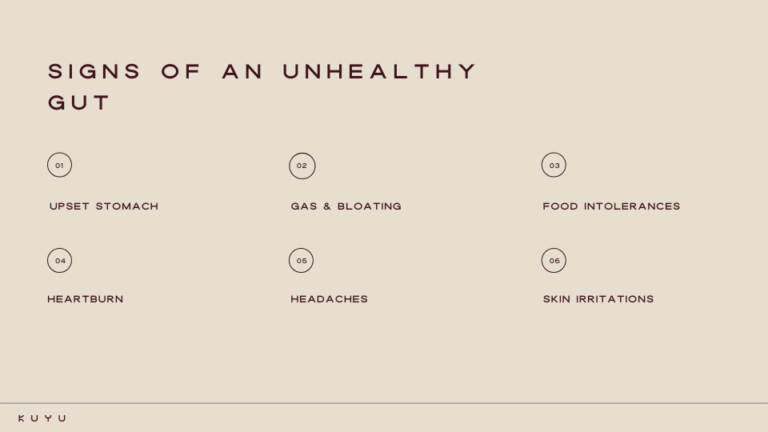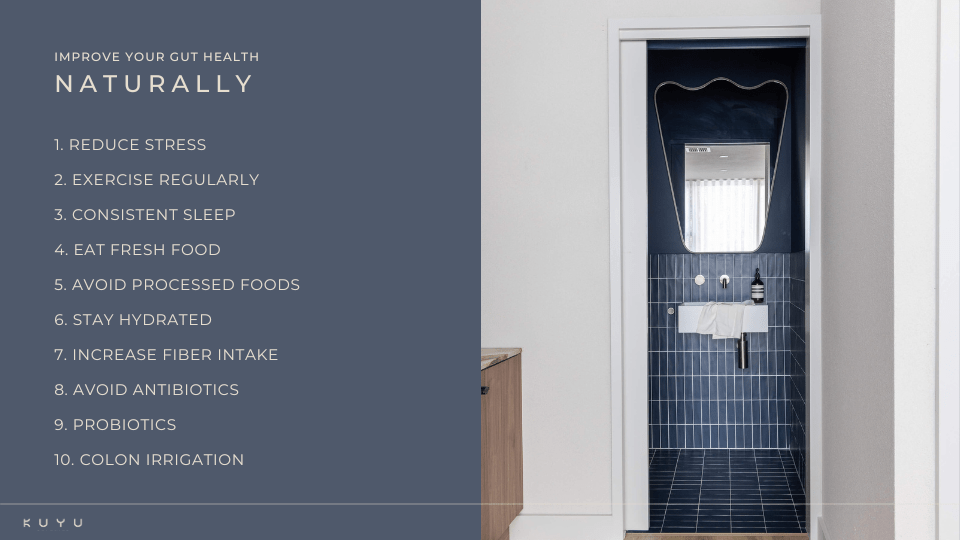
10 Ways To Naturally Improve Your Gut Health
April 2025
Gut health is not just about preventing an upset stomach; it’s also about improving and maintaining the body’s overall health.
The main role of the gut, or gastrointestinal tract, is to break down food and provide essential nutrients to the rest of the body. While this sounds like it only affects your digestive system, gut health is strongly linked to how the rest of the body functions and is key in supporting overall immune health.
Whether you’re experiencing bloating or regular headaches, are suddenly intolerant to some foods, or have skin irritations, your gut health may be the culprit. In this article, we’ve got ten ways to naturally improve your gut health, so you can get back to feeling your best.
The importance of gut health
Gut health is crucial in regulating the immune system, aiding digestion, and maintaining overall health. If the gut is unhealthy or unbalanced, the body will not function as well and can result in health problems like chronic fatigue, debilitating stomach pains, or skin irritations.
The ‘gut’ refers to the gastrointestinal system, which comprises the stomach, small intestine, and large intestine. Within the gut is an intricate ecosystem of bacteria and other microorganisms known as the gut microbiome. A range of good bacteria in the gut microbiome effectively breaks down food and encourages the body to absorb all the nutrients it needs to function.

6 signs of an unhealthy gut
1. Upset Stomach
An upset stomach can be a sign of an unhealthy or unbalanced gut. An upset stomach may cause pain, cause the feeling of fullness as soon as you begin eating, constipation, or diarrhoea. Generally, upset stomach discomfort goes away within a few hours or a couple of days, but an unhealthy gut can contribute to an upset stomach more frequently or consistently.
2. Gas & Bloating
Bloating and gas can occur when the gut has difficulty processing food and eliminating waste. Excess intestinal gas, which can bloat the stomach and make it feel tight, full, and sometimes painful, is often a byproduct of gut issues.
3. Food Intolerances
Food intolerances, like lactose intolerance or gluten sensitivity, may be caused by poor gut health. When the quality of bacteria in the gut struggles to digest certain foods, you can develop a sensitivity to these foods and experience symptoms like gas, diarrhoea, and abdominal pain.
4. Heartburn
Heartburn occurs when stomach acid backs up into the esophagus (the tube carrying food from the mouth to the stomach). This occurs when the stomach is not acidic enough to allow the lower esophageal sphincter (LES) (ring of muscle at the bottom end of the esophagus) to move food through properly.
5. Headaches
Gut issues have been strongly linked to headaches. A headache caused by gut issues refers to a dull, aching pain in the head and a sensation of pressure or fullness around the temples, forehead, or at the base of the skull.
6. Skin irritations
Skin irritations or imbalances are associated with an unhealthy gut. Research has shown that the gut and skin are connected through the gut-skin axis, which refers to how your intestine microbiome can influence the microbes on the skin. With that, an imbalanced gut can cause skin irritations and imbalances, such as rashes or red, bumpy, and itchy skin.

10 ways to naturally improve your gut health
1. Reduce stress
High levels of stress can wreak havoc on the whole body, including the gut. When stressed, the body releases hormones that suppress digestion and trigger a fight-or-flight response. Every day stress management strategies include meditating, walking, slowing down while eating, light movements like walking or yoga, and spending time with family and friends.
2. Exercise regularly
Exercising regularly can help diversify the types of bacteria in the gut and stimulate movement in the digestive system. Regular bowel movements are crucial for a healthy gut microbiome, and exercise encourages food to pass through the intestines more quickly. Brisk walking, jogging, yoga, pilates, and biking can help improve the digestive system.
3. Consistent sleep
Getting enough quality sleep every night can help regulate stress hormones, which, as we know, improves gut health. When you don’t get enough sleep, hormones can become unbalanced, and stress hormones can be released. Create a sleep routine, like meditating and limiting screen time before bed, to prioritise seven to eight hours of uninterrupted sleep each night.
4. Eat fresh food
Eating fresh foods, like fruit and vegetables, can provide the bacterial diversity needed for a healthy gut microbiome. Some fruits and vegetables, like raspberries, leeks, and onions, have the added benefit of being naturally rich in probiotics, which adds good bacteria to the gut.
5. Avoid processed foods
High consumption of processed foods can change the gut microbiome and lead to inflammation. Avoiding highly processed foods with high amounts of sugar, salt, and saturated fats can allow the gut to function better.
6. Stay hydrated
Drinking water and staying hydrated helps to break down food and allow the body to use all its nutrients. Water is also part of the stomach acid that aids digestion and softens stools, helping prevent constipation.
7. Increase fibre intake
Increasing foods rich in dietary fibres helps feed healthy bacteria in the gut, maintain regular movement through the digestive system, and improve overall gut health. Whole grains, fruits and vegetables, nuts and seeds, and legumes can be included in your diet to support a healthy gut.
8. Avoid antibiotics
Antibiotics treat bacterial infections by wiping out all the bacteria in the body, including the good bacteria in the gut. When antibiotics damage the gut’s healthy bacteria, it disrupts the delicate ecosystem in the gut microbiome. If possible, avoid antibiotics to keep the gut healthy.
9. Probiotics
Probiotics are live, good bacteria that the gut needs to thrive. Probiotics can be found in foods like yogurt, sauerkraut, kimchi, and kombucha, as well as natural probiotic supplements to support a healthy diet and improve gut health.
10. Colon Irrigation
Colon irrigation, also known as a colonic, removes toxins and boosts the immune system by gently flushing out the colon with warm filtered water. Colonics can return the gut to its natural state, allowing the digestive system to function more effectively and improving overall well-being.
Kuyu Colonics are Canberra’s leading provider of colonics. If you’re local to the area, we welcome you to our beautifully designed, holistic wellness studio to improve your gut health through colon hydrotherapy. To learn more about the benefits of colonics, get in touch with our friendly team today.